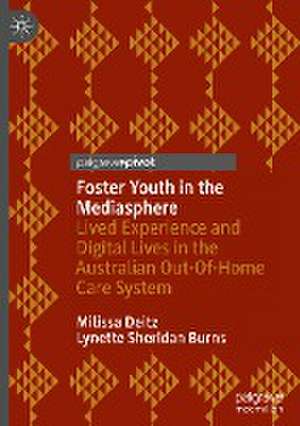Foster Youth in the Mediasphere: Lived Experience and Digital Lives in the Australian Out-Of-Home Care System
Autor Milissa Deitz, Lynette Sheridan Burnsen Limba Engleză Hardback – 17 noi 2022
Preț: 351.88 lei
Nou
Puncte Express: 528
Preț estimativ în valută:
67.33€ • 70.48$ • 56.04£
67.33€ • 70.48$ • 56.04£
Carte tipărită la comandă
Livrare economică 31 martie-14 aprilie
Preluare comenzi: 021 569.72.76
Specificații
ISBN-13: 9783031179525
ISBN-10: 3031179528
Pagini: 147
Ilustrații: XI, 147 p. 4 illus.
Dimensiuni: 148 x 210 mm
Greutate: 0.35 kg
Ediția:1st ed. 2022
Editura: Springer International Publishing
Colecția Palgrave Macmillan
Locul publicării:Cham, Switzerland
ISBN-10: 3031179528
Pagini: 147
Ilustrații: XI, 147 p. 4 illus.
Dimensiuni: 148 x 210 mm
Greutate: 0.35 kg
Ediția:1st ed. 2022
Editura: Springer International Publishing
Colecția Palgrave Macmillan
Locul publicării:Cham, Switzerland
Cuprins
1. Introduction.- 2. Foster Youth in the Mediasphere.- 3. Out-Of-Home Care in Australia.- 4. Out-Of-Home Care in the Mainstream Media.- 5. Digital Support for Young People in Out-Of-Home Care.- 6. Online Lived Experience.- 7. Current Research and Future Directions.
Notă biografică
Milissa Deitz is Senior Lecturer in the School of Humanities and Communication Arts at Western Sydney University, Australia, where she teaches courses in communication, digital media, and creative writing. Her previously published books include Watch This Space: The Future of Australian Journalism (2010), as well as the novel Bloodlust (1999) and non-fiction title My Life as a Side Effect (2011). Her research interests include grief, identity, and family; voice and the marginalised within digital storytelling; and young people, wellbeing, and technology.
Lynette Sheridan Burns is Adjunct Professor of Journalism at Western Sydney University, Australia. She is widely published in the fields of journalism and journalism education, with her book Understanding Journalism now in its third edition (2018). Her research interests include the impact of media reporting on social minorities, including indigenous Australians and those living withmental illness. She is a former President and Life Member of the Journalism Education and Research Association.
Lynette Sheridan Burns is Adjunct Professor of Journalism at Western Sydney University, Australia. She is widely published in the fields of journalism and journalism education, with her book Understanding Journalism now in its third edition (2018). Her research interests include the impact of media reporting on social minorities, including indigenous Australians and those living withmental illness. She is a former President and Life Member of the Journalism Education and Research Association.
Textul de pe ultima copertă
This book considers the impact of digital media and technology on lived experience for young people in foster care. While the extent and intricacies of foster care—known as out-of-home care (OOHC) in Australia, where this study takes place—are not widely understood by the general public, youth in care might struggle to construct a personal identity that goes beyond reflecting the stereotypes and stigma by which they are often recognised. In today’s digital environment, media can play a significant role in any individual’s developing sense of self, identity, and belonging. Deitz and Sheridan Burns examine OOHC through the lens of networked media environments and investigate the conditions that encourage belonging and resilience in order to establish the role that digital technology can play in supporting those conditions for individuals, family networks, and the care sector.
Caracteristici
The first study of social media and development of ontological security in Australian youth in foster care Delineates how social media can help support belonging and resilience for foster youth Contrasts mainstream media's representation of foster youth as the 'other' to self representation via social media
